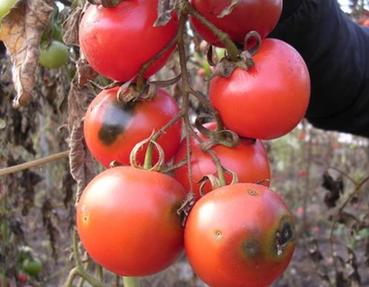Phil Russell
Established Member
Re copper fungicide, Bordeaux mixture. It certainly used to be sold by garden centres for potato and tomato blight control but I admit I have not looked for it for a couple of years. It can be used on tomatoes but you should remember to wash the tomatoes before eating them. It is a contact fungicide that will not get into the tomato flesh. I would be surprised if it is not available.
Late blight will only affect potatoes and tomatoes and, if you are unlucky, sweet peppers. It does not infect other garden / allotment plants. The best thing to do with infected foliage is to 'bin it' in your green bin or burn it. As noted above, the fungus can survive over winter in infected potato tubers; it is very rare for it to survive alone in soil. So good crop hygiene is a must for effective control. It is wind borne but needs quite high humidity and cool temperatures to survive otherwise the spores dry out. Similarly it needs a moist leaf surface to germinate on. Hence removing excess foliage on the tomato plants creates free air flow which can reduce infection.
Cheers, Phil
Late blight will only affect potatoes and tomatoes and, if you are unlucky, sweet peppers. It does not infect other garden / allotment plants. The best thing to do with infected foliage is to 'bin it' in your green bin or burn it. As noted above, the fungus can survive over winter in infected potato tubers; it is very rare for it to survive alone in soil. So good crop hygiene is a must for effective control. It is wind borne but needs quite high humidity and cool temperatures to survive otherwise the spores dry out. Similarly it needs a moist leaf surface to germinate on. Hence removing excess foliage on the tomato plants creates free air flow which can reduce infection.
Cheers, Phil





